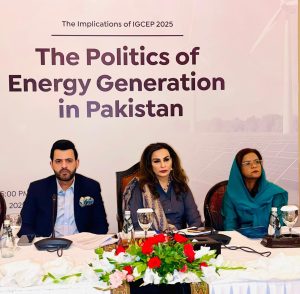- Advertisement -
ISLAMABAD, Oct 09 (APP):Pakistan’s Energy Future Hinges on Parliamentary Oversight: Barrister Danyal Chaudhry Parliamentary Secretary for Information and Broadcasting, Barrister Danyal Chaudhry, has emphasized that strong parliamentary oversight is crucial to steering Pakistan toward an affordable and sustainable energy future, while addressing a high-level briefing on “IGCEP 2025-35: The Politics of Energy Generation in Pakistan” held at Serena Hotel, Islamabad.
The event was organized by the Parliamentary Forum on Energy and Economy, bringing together lawmakers, experts, and policymakers to discuss the country’s long-term energy strategy.
Speaking at the forum, Barrister Danyal Chaudhry said that “the plan determining Pakistan’s energy future is not merely a technical document, but a covenant with the nation. Providing affordable, reliable, and clean energy for coming generations is our national responsibility.”

He reaffirmed the government’s commitment to implementing the Indicative Generation Capacity Expansion Plan (IGCEP) 2025–35 in line with national unity and provincial autonomy. He said the goal is to ensure quality electricity for citizens and to support businesses in driving economic growth and stability.
Chief Guest Senator Sherry Rehman voiced concerns over the centralized nature of the IGCEP, stressing that provincial voices from Khyber Pakhtunkhwa, Sindh, Balochistan, and Punjab must be included in the planning process.
“The transition to renewable energy is inevitable,” she said. “We must ensure environmental protection and make energy planning more inclusive and accountable.”
During the session, participants raised key questions about the planning and approval process of IGCEP, noting that two crucial elements provincial input and parliamentary engagement were largely missing.
Speakers underscored that, following the 18th Amendment and Article 157 of the Constitution, provinces now share powers in electricity generation and tariff regulation. Therefore, the IGCEP should ideally be reviewed through the Council of Common Interests (CCI) with formal mechanisms for provincial and parliamentary consultation.
Forum Convener Dr. Nafisa Shah outlined the forum’s mission as a cross-party platform promoting open discussion and research-driven debate on Pakistan’s pressing energy and economic challenges.
“While the IGCEP is a technical document, our goal is to advance energy democracy by involving experts, legislators, and the media in this crucial dialogue,” she noted.
Technical experts Muhammad Badar Alam and Omer Haroon Malik delivered detailed briefings on the plan, while Engr. Imtiaz Hussain Baloch explained NEPRA’s regulatory framework.
Provincial perspectives were shared by Senator Sana Baloch (Balochistan), Ahmed Kundi (Khyber Pakhtunkhwa), Mujeeb ul Haq (Sindh), and Muhammad Zubair (Secretary Energy & Power, KP).
Members of the National Assembly Asad Alam Niazi, Zeb Jaffar, Usama Mela, and Mobeen Arif added parliamentary viewpoints, emphasizing the need for transparency and inclusivity in the national energy plan.
The session concluded with closing remarks from Dr Shezra Mansab Ali, Minister of State for Climate Change, who reiterated that energy reform must align with Pakistan’s climate resilience goals.

